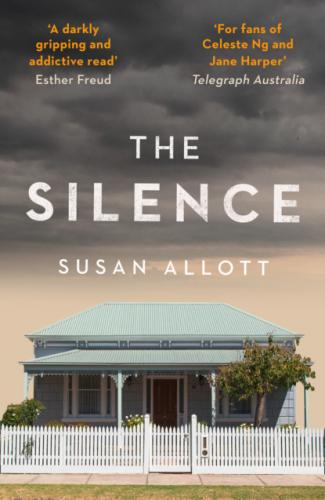The Silence. Susan Allott
Chapter 21: Ivanhoe, 1967
Chapter 22: Leeds, 1967
Chapter 23: Sydney, 1997
Chapter 24: Sydney, 1967
Chapter 25: Sydney, 1997
Chapter 26: Sydney, 1967
Chapter 27: Sydney, 1967
Chapter 28: Sydney, 1997
Chapter 29: Sydney, 1967
Chapter 30: Sydney, 1967
Chapter 31: New South Wales, 1997
Chapter 32: Sydney, 1967
Chapter 33: Sydney, 1967
Chapter 34: Sydney, 1997
Chapter 35: Sydney, 1967
Chapter 36: Sydney, 1967
Chapter 37: Sydney, 1997
Chapter 38: Sydney, 1967
Chapter 39: Leeds, 1967
Chapter 40: Sydney, 1967
Chapter 41: Sydney, 1997
Chapter 42: Sydney, 1967
Chapter 43: Victoria, 1967
Chapter 44: Sydney, 1997
Chapter 45: Victoria, 1967
Chapter 46: Sydney, 1967
Chapter 47: Sydney 1997
Chapter 48: Sydney, 1997
Chapter 49: Sydney, 1997
Chapter 50: Sydney, 1997
Chapter 51: Victoria, 1967
Chapter 52: New South Wales, 1997
Chapter 53: Leeds, 1967
Chapter 54: Sydney, 1997
Author’s Note
Notes
A note about language
Acknowledgements
Questions for Reading Groups
Erin Kelly interviews Susan Allott
About the Author
About the Publisher
In a basement flat in Hackney, the telephone rings. It’s two in the morning. Isla Green stands in the hallway, pyjamaed, barely awake. She is entirely sober. A good thing, if a little fragile; a little surprising. No tide of shame waits for her, no bloom of pain. She feels clean in her skin, like a schoolgirl. She can taste toothpaste in her throat.
On the third ring she reaches for the receiver. It’s Dom’s voice she will hear if the answerphone picks up, and his voice will set her back. It’s three months since he left and every day she means to wipe the message. She lifts it to her ear just in time.
‘Hello?’
It takes her a second to place him. ‘Dad?’
‘I didn’t wake you, did I?’
She doesn’t know why she’s gripping the receiver. Why a trill of fear has sounded in her head. It’s good to hear her dad’s voice, which is more Australian than her own these days. He’s got the time difference wrong, that’s all. At the end of the street a police siren starts its upward loop and cuts out. Its blue light flashes silently.
‘What time is it there?’
‘I don’t know.’ She stretches her free arm above her head, arching her back. In the eight weeks and three days since her last drink, she has been sleeping like the dead.
‘Shall I call back later?’
‘It’s fine. Is everything ok?’
‘I wanted to talk to you,’ he says. ‘Your mother doesn’t know I’m calling. She went into town.’
She sits down on the carpet. This is the thing she couldn’t put her finger on, that she should have known was wrong from the start. Her dad hasn’t called her in the decade she’s lived in London. It’s her mum who makes the phone calls, leaves messages on the answerphone. Her dad writes letters. He hates the phone.
‘What is it?’
‘I didn’t want you to hear it from your mother. She hasn’t taken it well. I wanted to tell you myself.’
She drops her head between her knees. She thinks, if he’s going to die, I’ll need a drink. Cold, practical thoughts: she will finish this call and she will put her clothes on. There’s an all-night takeaway at Clapton Pond where they sell six-packs of beer under the counter.
‘The police came to see me,’ he says.
‘The police?’
‘They’re looking for a woman I used to know.’
Isla lifts her head. She’s sweating. She runs her hand through her damp hair. ‘What woman?’
‘She was a neighbour of ours, back when we first moved to Sydney. You wouldn’t remember.’ He coughs. ‘It looks like she’s been missing a long time. Nobody’s seen her in thirty years.’
The police car crawls past outside, swinging its blue light across the walls.
‘What’s this got to do with you?’
‘The police think her disappearance is suspicious,’ he says. ‘They think I was the last person to see her, before she went missing.’
‘And were you?’ She tries to sound calm. ‘Were you the last person to see her?’
‘I can’t have been. She moved away with her husband. I told them there must be some mistake.’
He lights a cigarette, exhales. She thinks of Dom, smiling behind a flame.
‘Is she dead?’
‘They think she must be.’ His voice is quiet. A bad news voice. ‘There’s no record of her at all, in all that time. Her father died last month, left her most of his estate, but she hasn’t come forward. Her brother’s been asking around, trying to trace her. He turned up a few things that the police are looking into.’ He laughs unconvincingly. ‘One of those things is me.’
Isla finds a line of stubble along her shin. She runs her thumbnail over it, back and forth, until it hurts.
‘The cops are searching through their records,’ he says. ‘They keep records of people who died without being identified.’
‘What if it turns out she was killed?’
‘That would be the worst-case scenario, love,’ he says. ‘That would mean a murder enquiry.’
‘Jesus.’
‘Look, I don’t want you to worry.’
‘But if you were the last person to see her –’
‘I wasn’t.’ He shouts it. ‘I told you, I wasn’t.’
Isla rests her head back on her knees. In the part-light she sees unopened post on the doormat, soiled with the tread of her lace-up boots. Her bike, leaning against
